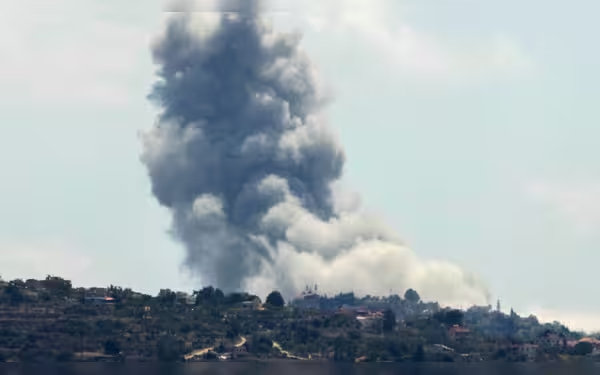Saturday, November 16, 2024 05:38 PM
Israeli Airstrikes Devastate Hula, Casualties Rise Amid Ongoing Conflict
- Israeli airstrikes target residential buildings in Hula.
- One Hezbollah member killed, three injured in attacks.
- Residents flee as humanitarian crisis deepens.
 Image Credits: arabnewspk
Image Credits: arabnewspkIsraeli airstrikes in Hula, Lebanon, lead to casualties and a worsening humanitarian crisis as residents flee amid escalating violence.
In recent days, the border town of Hula in southern Lebanon has been the epicenter of intense conflict, marked by devastating Israeli airstrikes that have resulted in significant destruction and loss of life. The airstrikes, which occurred on a Monday, targeted residential buildings, leading to the death of one Hezbollah member and injuring three others. This escalation in violence has forced many residents to flee their homes, adding to the already dire humanitarian situation in the region.
The airstrikes coincide with the visit of Amos Hochstein, the U.S. envoy to the Middle East, who arrived in Tel Aviv with the aim of de-escalating tensions between Israel and Hezbollah. This visit comes in the wake of Israeli Prime Minister Benjamin Netanyahu's announcement regarding the potential expansion of military operations in the north. The situation has become increasingly precarious, with residents describing the explosions as feeling “like an earthquake.”
Local residents, such as Samer, have expressed their fears and frustrations, noting that the strikes now target groups of houses simultaneously, a stark contrast to previous attacks that focused on single buildings. The mayor of Hanine, Ali Shbib Shehab, reported that his town, located just 2,000 meters from the border, has suffered daily destruction, with civilian casualties including women and children.
In addition to the airstrikes, Israeli artillery has shelled various towns in the Bint Jbeil district, further exacerbating the humanitarian crisis. A security source indicated that many areas, including Odaisseh and Kfarkela, are now devoid of residents, while some remain in their homes, relying on aid for survival. The situation is dire, with reports of Israeli leaflets urging remaining residents to evacuate, although the Israeli army has denied responsibility for these leaflets.
As the conflict continues, Israeli media has reported that military leaders are considering establishing a security buffer zone in southern Lebanon to protect northern residents from Hezbollah threats. Israeli Defense Minister Yoav Gallant has warned that the prospects for a ceasefire are diminishing, emphasizing that military action may be the only way to ensure the safety of Israeli communities.
In response, Hezbollah officials have asserted that Israel is incapable of extending the conflict to new fronts, citing the exhaustion of Israeli forces in Gaza. They maintain that their resistance remains strong and prepared for any developments. Recent reports indicate that Hezbollah has launched rockets targeting Israeli positions, further escalating the conflict.
The ongoing violence in southern Lebanon highlights the fragile state of peace in the region and the urgent need for diplomatic efforts to resolve the conflict. As the situation unfolds, it is crucial for the international community to engage in meaningful dialogue to prevent further loss of life and to address the humanitarian needs of those affected by the violence. The resilience of the affected communities is commendable, but without a concerted effort towards peace, the cycle of violence is likely to continue.













